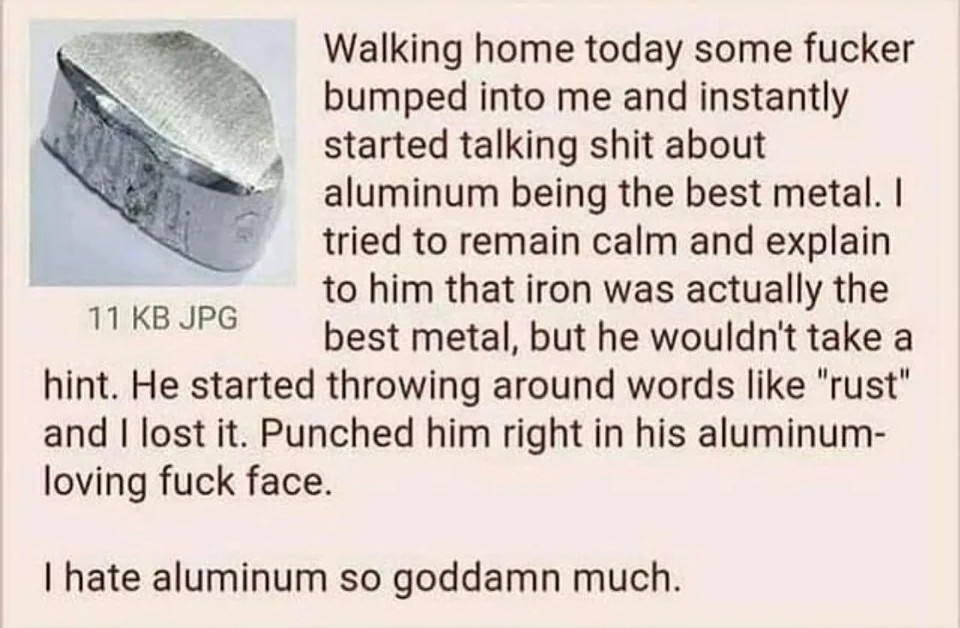this post was submitted on 08 Aug 2024
752 points (96.5% liked)
Science Memes
12071 readers
2163 users here now
Welcome to c/science_memes @ Mander.xyz!
A place for majestic STEMLORD peacocking, as well as memes about the realities of working in a lab.

Rules
- Don't throw mud. Behave like an intellectual and remember the human.
- Keep it rooted (on topic).
- No spam.
- Infographics welcome, get schooled.
This is a science community. We use the Dawkins definition of meme.
Research Committee
Other Mander Communities
Science and Research
Biology and Life Sciences
- [email protected]
- [email protected]
- [email protected]
- [email protected]
- [email protected]
- [email protected]
- [email protected]
- [email protected]
- [email protected]
- [email protected]
- [email protected]
- [email protected]
- [email protected]
- [email protected]
- [email protected]
- [email protected]
- [email protected]
- [email protected]
- [email protected]
- [email protected]
- [email protected]
- [email protected]
- [email protected]
- [email protected]
- !reptiles and [email protected]
Physical Sciences
- [email protected]
- [email protected]
- [email protected]
- [email protected]
- [email protected]
- [email protected]
- [email protected]
- [email protected]
- [email protected]
Humanities and Social Sciences
Practical and Applied Sciences
- !exercise-and [email protected]
- [email protected]
- !self [email protected]
- [email protected]
- [email protected]
- [email protected]
Memes
Miscellaneous
founded 2 years ago
MODERATORS
you are viewing a single comment's thread
view the rest of the comments
view the rest of the comments

having no fatigue limit is a bitch.
While I agree, I do have to clarify that there is a fatigue limit, it's mainly that the limit for steel increases so fast that few people are willing to put in the testing for billions of cycles to model ultra-high cycle fatigue
Where is that limit supposed to be? The line does not flatten, unlike that of steel. Which is a flat line from 1 million to 1 billion cycles. During the same number of cycles, aluminium drops from 25 to 14 ski, a loss of 44 %. The article specifically mentions:
Head's up, referring to it as a "limit" like your article did is incorrect. In engineering you have what's called an S-N diagram, which plots out the average time to failure based on average cyclic stress. Basically, a lower avaerage stress results in a higher average life. Also, this plot uses a logarithmic scale for both axis, because then all of the plots are straight lines.
For steel, the S-N diagram has what's called the "knee", which is where you have two distinct lines in the S-N curve: one horizontal and one at an angle, with the two intersecting at 1 million cycles. Referring to the knee as a limit (like in the article) is wrong because it's not a limit; it's the threshold where if you design a part to last beyond that (aka less cyclic stress than would get 1 million cycles) then it practically lasts forever.
In reality, the part won't actually last forever, since the S-N curve beyond 1 million cycles isn't perfectly horizontal. It's just that reducing your cyclic stress quickly increases your predicted life into billions or even trillions of cycles. This is known as ultra-high cycle fatigue, and it's generally impractical to do all the testing required to model because each sample would take months to test on the low end. Plus, there's little demand for such models in the industry, though there are a handful of PhD students and post-docs working on it
Does that change anything regarding the discussion? If the limit is quickly so high that it is beyond reasonable time spans? In the comparison at hand, aluminium has no fatigue limit, steel does. They still use aluminium for aircraft etc. due to the superior weight savings.
Yes, because the term "fatigue limit" makes lay people think the exact opposite of what is intended.